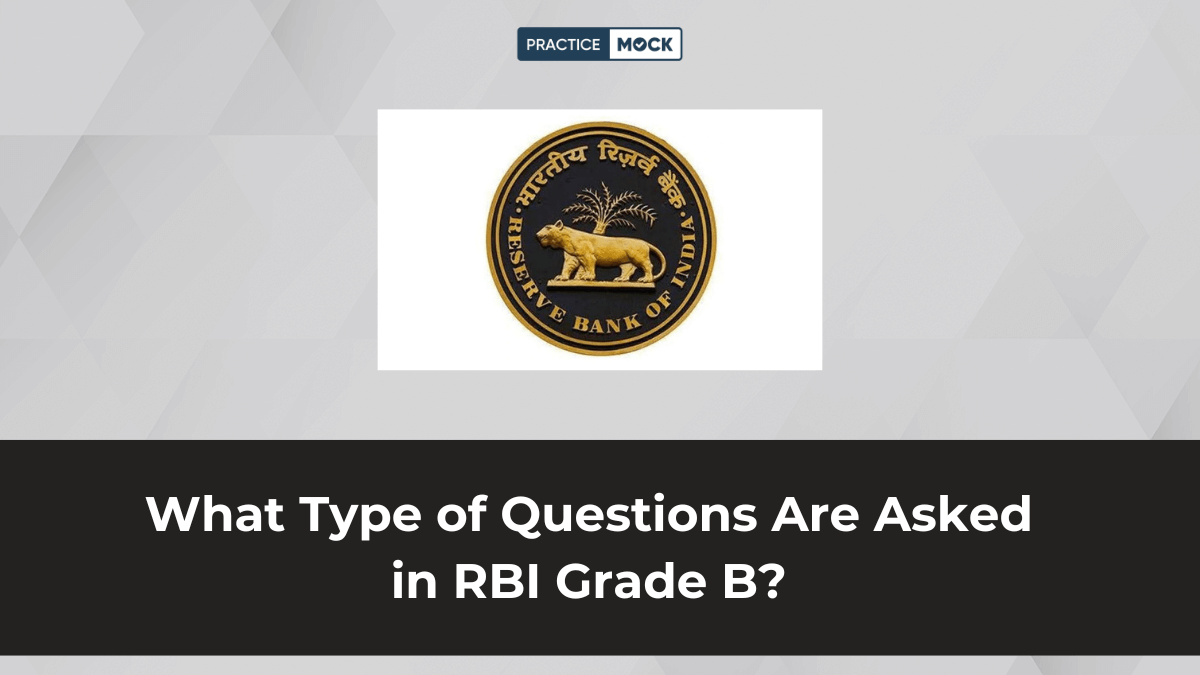Before starting the preparation for the exam, if it is understood what types of questions are asked in the different sections of the RBI Grade B exam, then preparation becomes easier and result-oriented. Then, based on that, you can design your study plan. Because you get to know which types of questions you struggle with and which types you can easily answer. This strategy can also help greatly in improving your time management skills. Each phase has its own set of question patterns, whether it is Phase 1 or Phase 2. And the most practical tool for this information is the mock test. In this blog, we will learn about the types of questions that come in all sections and provide you with a free mock test, so you can practically solve these questions and test your skills.
Types of Questions in RBI Grade B Exam
Now, we will break down the different types of questions from both Phase 1 and Phase 2 that you may face in the RBI Grade B exam. This exam has multiple sections, so that your knowledge and skills can be tested in different ways. After knowing about these types of questions, you will be able to equip yourself better to answer them and significantly increase your chances of success.
Phase 1: General Awareness, Quantitative Aptitude, English Language, and Reasoning Ability
General Awareness
- Questions about current affairs (national and international)
- Questions related to banking and economic policies
- Questions on government schemes and initiatives
- Static GK questions (capitals, currencies, etc.)
Quantitative Aptitude
- Arithmetic problems (percentages, averages, ratios)
- Data interpretation (tables, bar charts, pie charts)
- Simplification and approximation
- Time, speed, and distance questions
English Language
- Reading comprehension questions
- Sentence correction and rearrangement
- Vocabulary-based questions (synonyms, antonyms)
- Fill-in-the-blanks
Reasoning Ability
- Puzzles and seating arrangements
- Syllogism
- Blood relations
- Coding-decoding
Phase 2: Economic and Social Issues, Finance and Management, and Descriptive Paper
Economic and Social Issues (ESI):
- Questions about economic policies and reforms
- Social development issues in India
- Economic history and growth statistics
- Government schemes and budgetary allocations
Finance and Management:
- Corporate finance principles
- Financial markets and banking operations
- Management theories and practices
- Accounting and financial statements
Descriptive Paper:
- Essay writing on current issues and economic topics
- Letter writing (formal and informal)
- Precis writing
- Report writing
Importance of Mock Test
Taking mock tests is a vital step in your exam preparation. Mock tests give you a feel of the actual exam environment. Consequently, it aids you in learning about the types of questions asked in the exam, their difficulty level, and the time limits they involve. By regularly practicing with mock tests, you can fine-tune your methodology in dealing with each section. You can then easily find the corners that need improvement, and skyrocket your confidence. Plus, mock tests can be your best friends and guides who will let you practice answering questions quickly and accurately. And these are all the essential skills needed to crack the RBI Grade B exam.
Takeaway
Understanding all the types of questions that may appear in the exam is very important for good exam preparation. Through this understanding, you can design your study schedule properly and make necessary changes in it. Along with this, by attempting different types of questions from various subjects through mock tests, you can also judge your preparation and further improve it. And for this purpose, we have provided you with a free mock test. It is completely free, and it will fully enable you to assess your current level of preparation. Additionally, you can also take the full mock test series. Because continuous practice with mock tests is essential if you want to succeed.
FAQs
The syllabus covers General Awareness, Quantitative Aptitude, English, Reasoning, ESI, Finance, and Descriptive writing.
Yes, there is a negative marking of 0.25 marks for each wrong answer.
There are two phases: Phase 1 (objective) and Phase 2 (both objective and descriptive).
No, skipping questions without attempting them results in no marks, and there is negative marking for wrong answers.
Yes, the exam is available in both English and Hindi, except for the English language section.
Regularly read newspapers, follow current affairs, and refer to banking and economic updates.
Mock tests simulate the actual exam environment, helping you practice time management and familiarize yourself with question patterns.
- Sign Up on Practicemock for Updated Current Affairs, Free Topic Tests and Free Mini Mocks
- Sign Up Here to Download Free Study Material
Free Mock Tests for the Upcoming Exams
- IBPS PO Free Mock Test
- RBI Grade B Free Mock Test
- IBPS SO Free Mock Test
- NABARD Grade A Free Mock Test
- SSC CGL Free Mock Test
- IBPS Clerk Free Mock Test
- IBPS RRB PO Free Mock Test
- IBPS RRB Clerk Free Mock Test
- RRB NTPC Free Mock Test
- SSC MTS Free Mock Test
- SSC Strenographer Free Mock Test
- GATE Mechanical Free Mock Test
- GATE Civil Free Mock Test
- RRB ALP Free Mock Test
- SSC CPO Free Mock Test
- AFCAT Free Mock Test
- SEBI Grade A Free Mock Test
- IFSCA Grade A Free Mock Test
- RRB JE Free Mock Test
- Free Banking Live Test
- Free SSC Live Test



